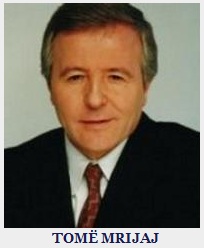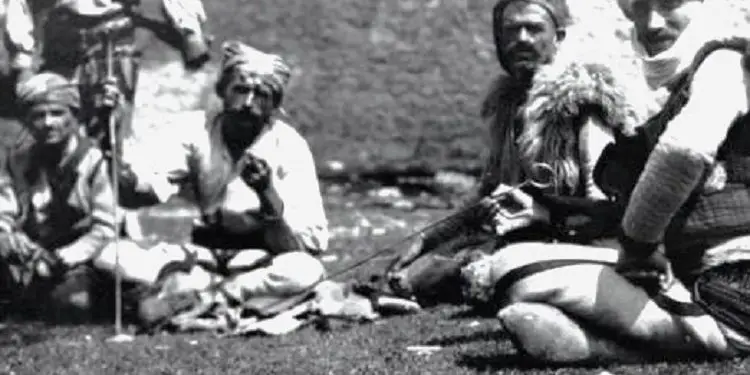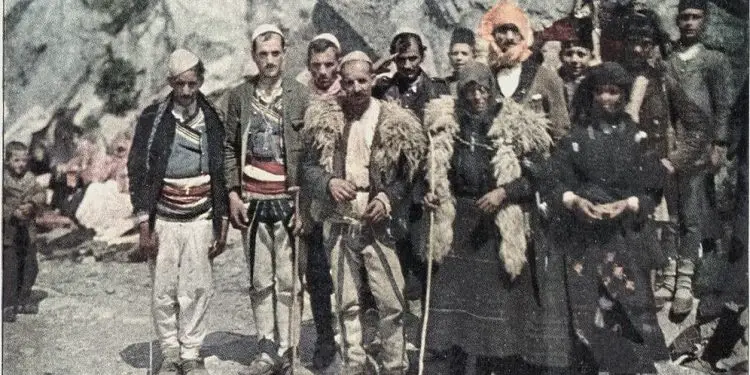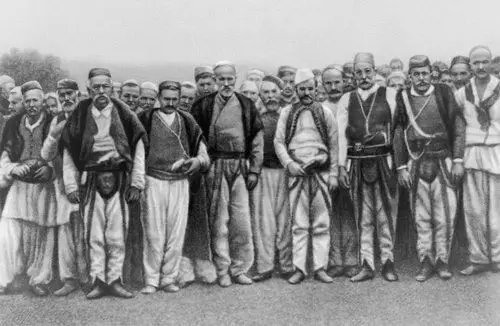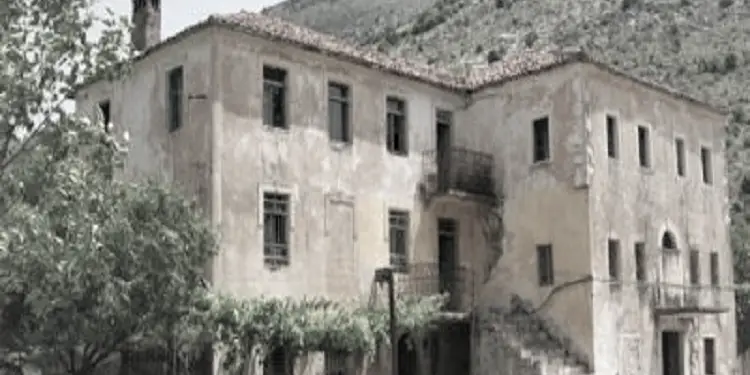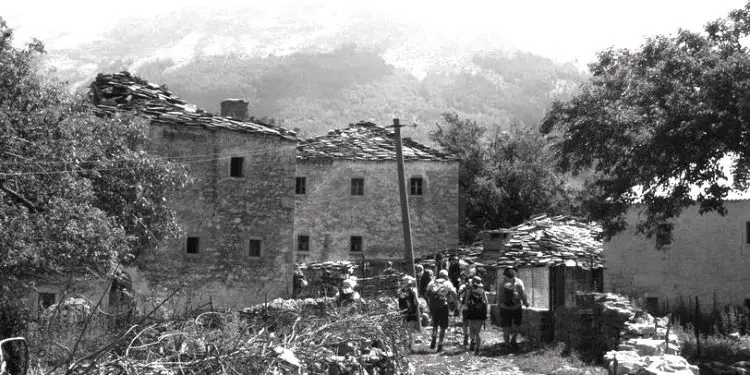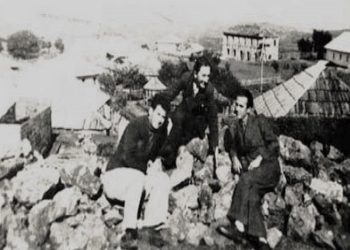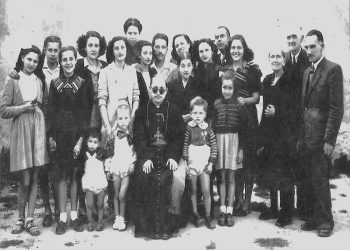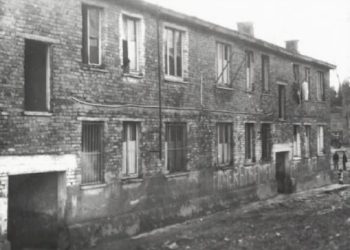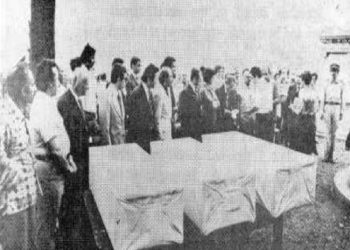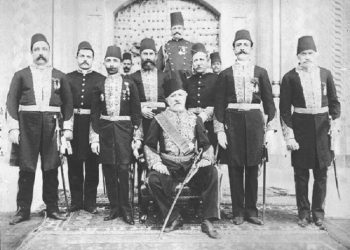By Tome Mrijaj
Memorie.al / The year 1889 was the year of indescribable joy in the large Mrijaj family, after the birth of a male for the circumstances of the time, it was one more rifle, to face the conquering goals of the predatory neighbors…! Preni’s father, Nikollë Mrijaj (1838 – 1907), due to the circumstances of the time, was married at the age of 40. The birth of the first child greatly changed his previous life (as a kachak), wandering for many years with a rifle in his hand, among the mountains, in defense of the Albanian lands. Little Preni had a special care from the family and especially from father Nikollë, who loved him like the eyes of his forehead.
The years pass very quickly and the baby begins to grow, amidst an environment full of pure Albanian traditions, which respected and honored the Canon of Lekë Dukagjin, the customs, the previous and contemporary culture of the time. At that time, the Austro-Hungarian troops had entered and stayed in our country, and as a close collaborator, Nikolla knew many of the soldiers and was their favorite person.
Cut, he had just turned 12 years old. The senior Austro-Hungarian soldiers, at the request of his father, took him to Austria, where he stayed for seven years. He begins his studies in elementary school and then continues his studies in high school. The young man from Kosovo, Pren Nikollë Mrijaj, comes into contact with and feeds on a famous and well-known culture all over the world, classical music, writers, high personalities of art and culture, for history, tradition, customs, the beautiful German language , the philosophers, since ancient times, the contribution and respect that many Austro-Hungarian personalities have had for the Albanians, etc.
Thus, at the age of 19, the young intellectual returns to his homeland, widely equipped with a deep western cultural horizon, thanks also to the very good command of several foreign languages, such as: German, Italian, Latin, French, which were taught in school programs of all levels in Austria. In the history of the Drin Valley region and beyond, the name and work of the first intellectual, Pren Nikollë Mrijaj, has been engraved. He has stood out as a generous, simple and modest man, of few words and a lot of work, charismatic, with all the people who have known him or worked with him, at many levels of local government in the province.
What stands out is the fact that the intellectual Pren Mrijaj had a special ability in communicating with people, regardless of their school level or culture, because he honored and respected the personality of each individual with dignity. All those who knew him say that he was special in the way he solved with wisdom, intelligence and patience the problems or worries of his compatriots whenever they went to his office to cry about their many problems. The high official Mrijaj never promised about the things that he could not do and were not in his competence, education and culture this received from the most advanced administrations of Western Europe and in particular those of Austria-Hungary.
Preni, who loved and respected his fellow villagers, carefully wrote down in the complaints block, every concern of the locals and very soon with maturity gave answers to the many problems that the residents of the area had, for which, he worked diligently as the highest civil servant in the province. Returning to the topic of describing Pren’s biography, I emphasize that when he returned from the summer holidays in 1907, his father (Nikolla) was killed treacherously by several centuries-old enemies, Turks and Slavs. A great pain had befallen the well-known Mrijaj family and the entire province. It was a delicate and very sensitive moment, after all, together; they must turn the pain into strength and keep their composure, for the great loss that happened to the family.
It must be said, that at the time the new situation created by the murder of his beloved father (who had done a lot for his son Prenin), for the young intellectual, a new life of hatred would begin. This premature death of the father was painful. This was bad luck, which fell like a bullet on the door of the Mrijaj family. During that year, according to the tradition of the time, when someone died or was killed, the doors of the house were open throughout the year for friends, who always came to comfort the family members. For the first time, young Preni was able to meet many of his father’s relatives and friends, who had come to share his pain with him, thus having a good time getting to know all his friends.
He met in the waiting room and held various conversations with many of them, such as: the Captain of Mirdita, Markagjoni, who had come accompanied by a large number of chiefs and nobles from the regions of Northern Albania and Mirdita. During the conversations in the men’s room, Preni learned a lot about the family history, witnessed by the stories and memories of friends and lovers of the large Mrijaj family, starting with his father, Nikola, grandfather Mark and great-grandfather Çun. Also, this disaster served as a great school of history, to learn in detail about various events, such as: freedom-loving uprisings, against the centuries-old Turkish and early Slavic invaders of the territory, outstanding figures of patriotism over the centuries, respect and honor, which the locals always had, for the ancestors of his family, where the elders recalled them and told Pren with great respect…!
When not even 12 months had passed since the tragedy in the family, Preni, thanks to the respect and admiration that the locals had for him, at a very young age (when he was not even 20 years old) was appointed as the Mayor of the Municipality of Zllakuqan. Even though he was young, he had the right preparations as a well-educated intellectual, with a deep Western culture. But on the other hand, he also had the school of life taken directly from the local residents, in the free daily meetings, in the odes of the most vocal men of the time, interweaving it with the school of family traditions, given in a way continued by his father, Nikola, who was and remained one of the most prominent men of that time.
The historical events of those years developed very quickly. It is a fact that the Albanian ethnic lands and the entire Balkan Peninsula as a whole lived through the long night of the brutal invasion of the Ottoman Empire, which as an invader had denied all rights to the peoples and especially to the Albanian people, on whom the sword fell of persecution and annihilation in many directions. In order to withstand the numerous assimilation oppression, anti-Turkish movements began to appear on the political scene, which, in later years, came and increased. During the efforts for freedom, independence and curbing the assimilation of the Albanians, the leaders of many municipalities were put in front of the uprisings, and in particular the wise and far-sighted words of the representatives of the Catholic clergy, who, with a sense of patriotism, encouraged the people and true patriots, for to stand up with rifle in hand, and become lord of the fragile fate of the Motherland.
The youngest president in the history of Kosovo, the outstanding and determined intellectual, the fearless patriot, Pren Nikollë Mrijaj, found himself in this situation. He, from the first days of work as mayor of the municipality in Zllakuqan, was very closely connected with the local Catholic clergy and beyond, knowing that the word of the Catholic clergy carries weight and respect among the people. Thus, as the historical sources and documents of the time of the National Renaissance (which, fortunately, have started to be published in many biographical and historical books in Kosovo), there for more, we see that the new president created closer ties and continuous cooperation with the tireless patriotic activist of the National Renaissance in Kosovo, the priest Father Engjell Palaj O.F.M. (1870-), who at that time worked in the Church of Saint John the Baptist in Zllakuqan.
It was the time of the reawakening of the national consciousness for freedom, against the Turkish invaders, which was being noticed through the Albanian national representatives, at the end of the 19th century and the beginning of the 20th century. The joint activity of the clergyman Pader Palaj, with the new mayor of the municipality in Zllakuqan, Pren Mrijaj, was prominent and distinguished in many ways. Both patriots often talked about cooperation for the benefit of the Drin Valley region and beyond, according to both idealists, they had the good idea and intention to raise awareness and mobilize anti-Turkish insurgent forces.
Thus, the newspaper “Vardar”, which was published in the city of Skopje, which bears the date January 18, 1909, among other things, quotes that: “In March of this year (1909), Father Engjëll Palaj, in cooperation with the leaders of the country and the mayor of the Municipality in Zllakuqan, etc., had formed an anti-Turkish fighting group in Budisalce of Dukagjin, under the command of the patriots; Zef Gjidoda, Zefit i Vogël, Pjetër Qelit, etc., who were joined by about 400 Albanian fighters with weapons in hand, from Lugu i Drini, where they were all of the Catholic faith”! On the other hand, the mayor Mrijaj, like all his compatriots, had persistently asked to join the anti-Turkish nationalist gang with weapons in hand.
This also came from the fact that his father Nikola was killed two years ago by Turkish-Slavic forces. The clerical revivalist Father Engjëlli, upon hearing the mayor’s insistence to join the freedom-loving gang, convinced him not to go, because the country and the municipality needed his care, since he was the only educated personality in West. Thus, from the Mrijaj family, two of its members, Preka and Lleshi, joined the squad voluntarily with guns in hand, which later, with the instructions of friar Padër Engjelli, joined the squad of Isa Boletini, Sadik Rama and Bajram Curri. Another close collaborator of the mayor of Zllakuqani was the progressive adviser, with a western vision, the Catholic clergyman, Father Lorenc Mazreku O.F.M. (1872-1944).
In opposition to the denationalizing policy of the Turkish Empire and the Serbo-Slavic Kingdom in our lands, the prominent education-loving trio of clerics of the time, such as: Father Shtjefen Gjeçovi O.F.M., Father Engjëll Palaj O.F.M. and Pader Lorenc Mazreku, O.F.M., with courage and determination, opened the first Albanian school in 1907, in Zllakuqan in Lugut i Drini. The intellectual Mrijaj continued the same friendship with the other Franciscan priests who served during those years in the Church of Saint John the Baptist in Zllakuqan. Here he singled out the two brothers from Shkodra, Father Pashk Prela O.F.M. (1877-) and Father Marjan Prela (1887-).
Cultural lover Pader Pashku came to the aid of the people of Zllakuqan in those difficult years 1916-1919. Thus, in 1918, the Albanian school of Zllakuqan (which was opened in 1916 by the Austrian Government, (my note T.M.), is closed by the Serbian colonizing regime and its teacher, Ndue Vorfi, is persecuted…! Nikollë Mrijaj is cut off, while he is faithfully performed the duties of the Mayor of the Municipality, he was a living witness of those hot events of the period of 1918-1919, when the Serbo-Malaysian army and gendarmerie set fire to the houses and properties of the inhabitants of Lug i Drin, where, the families of this parish, who were able to escape, were forced to leave the hearths of their ancestors with pain in their souls and settle in the district of Gjakova, with their friends and relatives.
The facts prove that on those days in Zllakuqan, there were seven killed and many wounded, among them three women and four men. Even in other villages, in Lug i Drini, there were people killed, injured, burned and looted. From the historical sources and documents of the Mrijaj family, which have been preserved for many years, during the Slavic massacres and looting, the mother-in-law of the mayor of the municipality, Pren Mrijaj, a noble son of the well-known family of to the settlements of Leskoci. She, that day, to her extreme luck, found herself next to her family for a visit…!
Seeing that the situation in Zllakuqan and the surrounding area was getting worse and worse (due to the intervention of the Slavic forces), Father Pashk Prelaj OFM ordered the Mayor of the Municipality to urgently gather some men from the Drin Valley and they traveled overnight, to Shkodër. The armed delegation from Lugdrina, headed by the mayor himself, Pren Mrijaj, (after all, he knew several foreign languages, found it easier to inform the diplomats directly. They, who were all dressed in national costumes and riding on saddle horses.
The representatives of the province held informative talks with the foreign consulates (it is known that Shkodra had more than 7 foreign consulates at that time, my note T.M.), who were there, describing to them the serious situation that Lugu i Drini was experiencing in those painful days from the biblical removal of the native population from their ancestral homes and properties. The writing of detailed information from the high ecclesiastical circles, on the current situation and the direct conversations made by the head of the Lugdrina delegation, the mayor Mrijaj, influenced the cessation of this unprecedented terror until then.
At the height of the rapid development of events, as the historical sources of the time say, the reaction of the Yugoslav Government was also immediate. This came from the fact that the representatives of the Catholic Clergy and the selected Albanian delegation from Lugdrina, led by the chairman, had done a very good job in informing the foreign diplomats, who had immediately intervened in diplomatic channels. On the other hand, in the chauvinist camp of the Yugoslav Government, we see that its leadership, out of anger at the loud noise that the united Albanians had made, issued the ordinance (decree) that the entire population of these three, that they had abandoned due to violence their burned hearths, to return to their properties, within a certain period…!
This ordinance was a double-edged sword. Thus, if you carefully look at the decree issued by the Yugoslav regions, it turns out that they had conditioned the return of Albanians to their abandoned homes, with a very short period of time, due to the anger of foreign diplomats, why they did not allow realism of the plan of the Serbs, which aimed at denationalization with forced migration from the ancestral hearths. This was a great victory and success, thanks to the merit of the local Catholic Clergy and the Lugdrina delegation, which acted urgently to resolve the acute Albanian issue.
In the odes of the people of Lugdrina, they spoke many times about the impressions of the delegation of Lug Drini, which met with the representatives of accredited foreign consulates in the ancient city with history and culture of Shkodra. Word of mouth, the memories have been preserved, which have arrived fresh to our days. This is how they show how the delegation from Kosovo was well liked by the residents of the city of Shkodra, for their characteristic clothing, with outstanding washability and traditional folk style of the rich Drin Valley region. The horses of the Albanian representatives were all chosen and with very luxurious (expensive) saddles, with mirrors and decorated tufts, which at that time were a rare characteristic for long journeys.
Among the many memories, it is shown how a well-known and authoritative man from Thethi i Shala, named Sadri Luka, approached the men of the delegation with a smile and after greeting them one by one, persistently invited them to go to his guest house. in Theth. He addressed the newcomers, that today you are all my friends, because you are tired from the long journey and still have a long way to go. After a friendly welcome and relaxation, my people can escort you to the place where you want to go. To make their journey easier, my people can direct you to the shortest route to Kosovo.
After a long journey, steep mountains, lush with tall oaks of barren forests, everyone arrives at the well-known tower of Sadri Luka in the town of Theth of Shala (Dukagjini province), where, the master of the house with his family members, they are given a reception with typical Albanian traditional generosity prominent among the highlanders of our Albanian territories. That night, in the big Luka house, there were many friends and well-wishers, who had come to greet the delegation from Lugu i Drini. It really became a big common fraternal mahogany, as is the tradition and habit of our mountains. These noble inhabitants, over the centuries, have preserved and still keep alive today the best virtues of Albanian hospitality.
In the morning, the owner of the house, Sadri Luka, addresses the guests, with the words: “I was impressed, that this youngest, who is your father, almost the entire time last night did not speak at all”! A member of the delegation, who was closer to the owner of the house, addresses Sadri, that: “This young man, who impressed you last night, is the mayor of our Municipality in Lug i Drini, and he is the only educated person abroad in Austria. He is our honor and pride”! Among others, the mayor of Pren Municipality, Nikollë Mrijaj, spoke, who addressed the owner of the house: “We thank you, on behalf of the entire delegation! For the better we come. In your inn, we and everyone who comes, increase the honor very much for the hospitality. Thank God, that this generous family always made such sacrifices, for the good of the nation”!
After several years, he had come to visit the Mrijaj family by order of the owner of the house, Can Tahiri. Unfortunately Pren Nikollë Mrijaj had died years ago (1923). Cani had conveyed Sadri’s orders to Pren Nikolla’s son, Nikollë Pren Mrija, and other family members. Among other things, he says to them: “Pren Mrijaj was a man of few words, but prudent in our house, which at that time had left a lot of impressions on the master of our house, Sadri, who, he told me to tell you, that he wants that among us, we can make friends with your family between marriages”!
As it was said at the time, Cani had stayed for more than a week as a friend in our house, where he was visited by many family friends, who were impressed by the behavior and intelligence of that man well versed in the traditions of the highlanders of our highlands Christmas. After the departure of Father Pashk Prela, at the end of 1921, his brother Father Marjan Prela, born in Shkodër, came to the Church of Zllakuqani. Just like his brother, Pader Pashku and Pader Marjani, adapted very well in a place where, before, Pader Pashku’s brother had served. His brother’s friendship quickly connected him with the mayor of Zllakuqan Municipality, Pren Nikollë Mrija.
At the beginning of 1923, the mayor remained in history, laying the foundation stone of the new Church of St. John the Baptist in the town. In 1924, work began on the construction of the aforementioned new Church. Painful, but life has unexpected events, which every person must face consciously. Then, when everything was going very well in the Municipality, in the family and within the community of friends and relatives of the energetic and tireless mayor, Pren Nikollë Mrijaj, his body was engulfed by an appendicitis (cecal) pain, which, bursting it hit the body hard…!
Franciscan Father Marjan Prela was also present at his last breath together with family members, who welcomed his death with great sadness. Pren Nikollë Mrijaj has always maintained close ties of friendship and cooperation with the Captain of Mirdita, Marka Gjon and Zef Ndoci, who had hosted us many times in our guest house. These centuries-old bonds of friendship and cooperation, for the national issue, Preni the Younger, continued without interruption, remaining faithful to the exemplary path of his father…!
The sons of Pren Nikollë Mrija, Nikolla and Ndreca, have added many new families, expanding the genealogical tree of the Mrijaj tribe. The above, until our days, have been increased by over 100 members alone, in a period of several decades, which live and work with families in their homeland in Kosovo, Europe and the USA. Memorie.al




